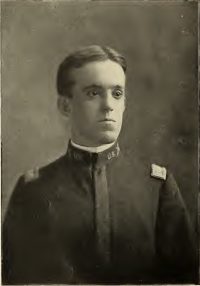DEAR MOTHER: The letter heading is not as pleasant looking as some I have sent to you. I have been sick with a fever for fifteen or sixteen days; but it was not serious although uncomfortable. Just at present I am getting back my strength and trying to make my clothes fit once more. This hospital used to be a Spanish one and it is pretty comfortable and commodious. Where I am there is a large courtyard with the buildings grouped around and plenty of trees and grass to make it pleasant for the convalescents. The Fourth Infantry band used to give two or three concerts here in the courtyard every week, but the band has been ordered to join the regiment, so that we have lost some good music.
While I was sick at Calamba, the headquarters of the Twenty-first, I got my appointment as first lieutenant, and lately I have been ordered to the Ninth, which is operating to the north of Manila. A friend of mine in the Ninth was promoted to the Nineteenth, and as he has very good reasons for wishing to stay in his old regiment, I am going to transfer with him; and by the time you get this I shall be in the Nineteenth Infantry. The Nineteenth has not been in the islands very long, and two-thirds of the regiment are stationed on the island of Panay, at the city of Iloilo. It is said to be a very healthy city, and I should not mind going there and seeing more of the islands. The rest of the Nineteenth is near the city of Manila. Everything is quiet at present, and the rebels do not stand when our troops get after them. The rebels seem to be fighting for time; that is, until our Congress meets. The general sentiment is one of a kind of pity for the poorly equipped Filipinos. We do not have much heart in the struggle and wish it would soon end. The word duty is small, but it makes the soldier fight, and it seems to underlie a great many actions in life. I have never been homesick, although I have thought many times of you dear ones, your joys, and happiness, for all should be happy and joyful with the birds that sing about the beautiful house in Quincy.
I received a letter from father while you were in London together, and you have returned to Quincy some time ago. This is the witching time o’ year in New England, and I can smell the orchards as the fruits are being picked. I would send for a barrel of apples if I were settled in the city, but one wants as little as possible to carry and look after in the field. My baggage has usually been a dress suit case, and a big piece of heavy canvas into which I can put blankets, folding cot, and many other articles, and then the whole thing rolls up into a good solid roll, and two heavy straps hold it together. This roll and the dress suit case have never weighed much over fifty pounds, and an officer is allowed to carry 150 pounds in the field. All the marches one goes on in this country are so hard that one has to carry everything with him. I remember one march or expedition we went on with six companies of the Twenty-first stationed at Morang [Morong] on the Laguna de Bay. About four or five hundred men started off, and the only transportation was four or five coolies or Chinos who are attached to each company and carry the rations. My outfit was the clothes I wore, my blouse, a canteen, haversack, revolver, and poncho. The haversack is supposed to hold rations, but there is always room for some comforts, such as toothbrush, soap, and maybe a pair of socks. I used to march, when it rained, in undershirt and poncho, keeping my blue shirt dry in the haversack so that I had a dry shirt to keep me warm for the night. In this march we had some hard walking, but we had enough to eat, and were always able to sleep in a native house at night. Some of these native houses are very comfortable, for they are, of course, built to meet climatic conditions, and they do it. I had a large house at Paete, where our march ended, and where we stayed two or three days. This house had a big, roomy ground plan and there was a kind of store on the ground floor. Back of this was a large room which was used as kitchen for my company. The living rooms were reached by a stairway on one side of the store. These rooms were a large front room, which I appropriated; a dining room, into which the staircase led; and finally a large kitchen with a stoop near by. Mahogany was about the only wood used in the building; and I saw one gutter about eighteen feet long hollowed out of a mahogany log over two feet in diameter. So you see that some of the woods which are considered so valuable by us are used for the commonest purposes in the lake regions. There are large quantities of fine timber in and about the mountains which skirt the lake, but like many other things in the islands, they need to be utilized and bought by some of our enterprising Yankees to show what there is in these forests.
It is getting dark and I am getting tired, so that I will finish this another time.
